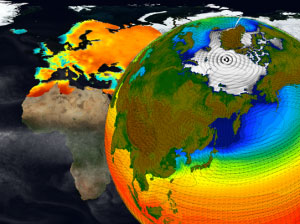 Modern meteorology deals not only with the study of the physics and
nonlinear dynamics of the atmosphere, but also with the efficient analysis of the huge amount of information resulting from
the observations and numerical simulations with global and regional climate models. Although meteorology was originally concerned
with short-range prediction (1-3 days), this discipline has greatly
evolved and nowadays the forecast horizons expand to seasonal prediction (predicting climate anomalies months in advance) and climate
change projections (decades); in this case, the atmospheric models are
coupled with other components of the climate system (ocean, land, cryosphere, biosphere). These new horizons have prompted a growing interest in climate services, which aim at developing services providing actionable regional climate information for climate prediction and projection applications in different sectors, including climate change impact and adaptaion studies.
Modern meteorology deals not only with the study of the physics and
nonlinear dynamics of the atmosphere, but also with the efficient analysis of the huge amount of information resulting from
the observations and numerical simulations with global and regional climate models. Although meteorology was originally concerned
with short-range prediction (1-3 days), this discipline has greatly
evolved and nowadays the forecast horizons expand to seasonal prediction (predicting climate anomalies months in advance) and climate
change projections (decades); in this case, the atmospheric models are
coupled with other components of the climate system (ocean, land, cryosphere, biosphere). These new horizons have prompted a growing interest in climate services, which aim at developing services providing actionable regional climate information for climate prediction and projection applications in different sectors, including climate change impact and adaptaion studies.
Our
research is focused both in theoretical and applied topics of this
discipline, with special emphasis in regional climate variability and those aspects involved in seasonal
forecasting and climate change projections. Our interests include the
study of simplified atmospheric models (Lorenz-like models, barotropic
vorticity model, etc.) to analyze theoretical aspects of predictability
and ensemble forecasting in nonlinear spatiotemporal systems, and the
numerical simulation of weather and climate at regional scale using
regional atmospheric models such as the open-source WRF model (Weather
Research and Forecasting, www.wrf-model.org). We are also involved in the analysis and postprocessing of observed and simulated climate datasets using statistical and machine/deep learning techniques. These activities include the
development of efficient data processing techniques (sucas as downscaling and bias correction/adjustment) and their implementation
in web portals as applications and services, so they can be used to
provide actionable regional climate information for users from different sectors (agriculture, hydrology, energy, etc.). The group has also experience in data management activities and climate data services, maintaining one of the nodes of the Earth System Grid Federation (ESGF) providing support to CORDEX activities.
The group is internationally recognized in the topic of downscaling (using both regional climate models and statistical and machine learning techniques), and is actively involved in international activities such as CORDEX (Coordinated Regional Climate Downscaling Experiment), FAO (consulting and development of tools such as as MOSAICC) and IPCC (Task Group on Data). Moreover, the group has coordinated the development of the IPCC Interactive Atlas (http://interactive-atlas.ipcc.ch) in partnership with Predictia (a spin-off company of the group).
Some recent high-impact publications of the group (notebooks and code available in the GitHub repository):
The climate and data science group collaborates (in the framework of a CSIC associated unit) with the Meteorology and Computation group of the University of Cantabria and maintains a technological alliance with the IT company Predictia (a spin-off of the group with more than 15 years of activity), collaborating in a number of research project and transfer contracts, including several contracts with the Copernicus Climate Change Service (C3S).
Group Projects
Group Members
Group Publications
